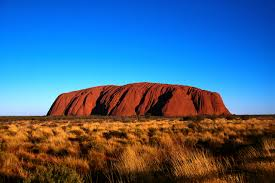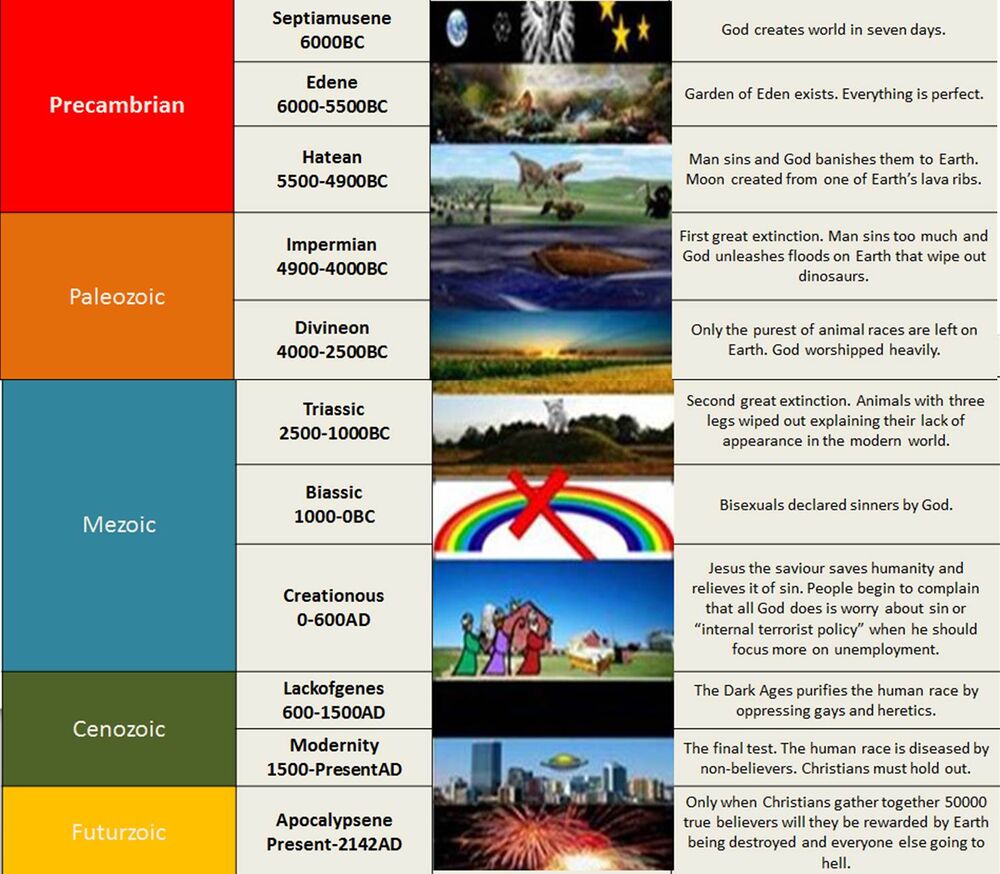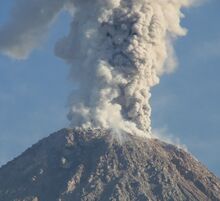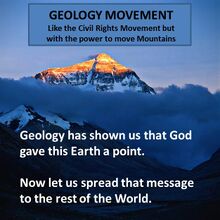Geology
Geology is the study of "God's Creation" (derived from Latin: "geo" meaning "God" and "ology" meaning "creation"). "God's Creation" is a term that Jesus used to refer to the Earth and therefore in modern colloquial English, geology is sometimes referred to as the "Study of the Earth." It is researched and explored by studying ancient biblical scripts and therefore is, like geography, a branch of history, referred to as Natural History.
Some key sub-categories of geology include "Creationism", which explains how the Earth was formed out of dust and rock, "Seismometry", which studies the God's wrath by measuring the shock waves that his anger emits, and "Paleontology" - the study of the last group of sinners who walked this Earth and of God's punishment towards them.
Geological Timescale
The Creation of the Earth (Creationism)
The Earth was created in the year 4000BC, which coincides with the time that did not leave any evidence of human scriptures or civilisation. The Carbon dating proves this right, whilst other forms of radioactive rock prove it wrong. However, these forms of rock have recently been eliminated by geologists, as the only presence God accepts on his Earth is that of several Carbon isomers.
The World has been created in seven days, which can be proven by many remnants of Earth's creation (still in our landscape), such as cave paintings and books hidden in cracks of many cliff faces all around the World, which God is said to have drawn or wrote. Despite the fact that these paintings and books contradict each other heavily and some don't even make sense, the mere fact that there are so many pieces of evidence leads to the empirical conclusion that the Earth was created within seven days.
Earth in its infancy
Seconds after Earth's formation, it was already a vast ball of rock surrounded by a fully functioning atmosphere where trees, grasses and animals lived happily in comfortable conditions. Archaeological excavations in the Middle East (in Southern Syria, for example) give proof of the fact that God banished Humans from the Garden of Eden very soon after, around 7.5tya (thousand years ago), which was be the first state purgery he would commit.
The Divineon and Mezoic Periods
The Great Floods of 4000BC helped to eradicate even more sinners and dinosaurs. Soon after, God's pedantic nature, that told him to get rid of all the traitors, would make him send down Moses (originally his son) to the Earth in order to save a small group of true-believers from yet another Apocalypse. Scientific research done by geologists clearly shows that Moses somehow annoyed God, which was the cause of Moses being renounced as the God's son. He was soon replaced by Jesus, however, whose behaviour was claimed to be a lot better than his predecessor's.
Some geologists dispute the theory of Jesus being a son of God, as the fossils of his body (which 3000 Catholic Churches have kindly provided for research) looked more like fossils of 100 different men. They conclude that Jesus was more than one person.
Critics say that the Bible - the source of all geological research, could not allow for more than 50 Jesuses. Nevertheless it never says that Jesus was one man. In this case the "Multi-Jesi" theory can be backed up by various witnesses who have seen the Messiah as far as Alaska. But it also opens some other important questions, such as how many Messiahs have actually been crucified.
The Cenozoic Downfall
Despite God's attempts to cure the planet through the whole time-span of geology, he has not succeeded in quelling a small minority of wretched un-believers, who still walked on the Earth. Through extensive research and many experiments, such as "Gino Spectroscopy of Chalk", geologists have discovered the Dark Ages, a period of time which eliminated every being who doubted or could doubt the God's existence, which was - almost everyone. By that time God was kicking himself as he could not understand how he, an all-knowing and perfect God, could have created people as evil as that. Somehow humanity held out and God gave up. He decided to stick to saving the people who loved him the most and sending to Hell those who did not mind being expatriated from the Garden of Eden.
Still, geology proves that in this Matrix, that got way out of hand, there exists God's computer program, which will attempt to destroying the Universe, in what Geologists refer to as the Futurezoic period. Geological calculations predict that this day, baptised - the "Judgement Day", will happen in 2012 2120 and that only the true-believers, known as the Mormons will survive and go to heaven.
Sub-Topics of Geology
Palaeontology
Paleontology covers the examination of any species that no longer exists. The only possible reason for the disappearance of such species would be a mass sin it committed. According to the Bible, only humans are capable of thinking for themselves and have consciousness, and therefore animals cannot sin; however it is never mentioned that organisms other than animals lack consciousness and therefore we may presume that these organisms, such as trees, mushrooms and algae, think for themselves and sin for the Devil. It can also be concluded that any species which is today extinct is certainly not an animal. There is of course the exception of three-legged animals, whom, despite their name are not considered proper animals.
One of the great achievements of palaeontology was uncovering the fossil of Noah and his wife from their burial site in 2004. Evidence clearly point to the fact that they are his remains, as they have been found outside Prison 43 in Siberia with "Noah No.13" branded on the skull, which means that in the whole history of mankind there definitely was a person called Noah and that the story of the Great Flood and Noah's Ark must have been true.
Palaeontologists spend large amounts of time on beaches searching for fossilised remains of Saints and Saviours from all the geological eras. St. Mark's skull was found washed up on a beach in Dorset in 1934. It is now called the "Jurassic Coastline", as St. Mark was from the Jurassic period (a subset of the Creationous Era).
Seismometry
Seismometry studies the effects and causes of God's wrath waves or as they are scientifically known, "Geoseisures." Geoseisures are shock waves that travel through the Earth's crust when some of the hell (situated in the core of the Earth) erupts. As St. Paul said in his Fishing Chapter 2 Psalm 4:5 of the Bible, "for every action there is an opposite and equal reaction", so when a fireball of magma escapes from hell, God counteracts this spreading of sin with his wrath. When these two forces meet a Geoseisure is born.
Seismologists are very useful for predicting when an apocalypse will occur. They look for huge disturbances in the outer mantle, which would signify that there are too many sinners on the planet. Seismometry is therefore considered the most vital part of geology.
Vulcanology
Vulcanology is the study of paganism and false religions (i.e. Star Trekery} . While this may be an indecent job for most sane people, some brave geologists venture into understanding how they have ever come to exist on Earth. Vulcanology is vital for allowing humans to understand how to get rid of these false beliefs and return to a natural geological state of pure Christianity.
To reach areas of heavy paganism, geologists must travel to the most remote areas of the World, namely Scandinavia and Iceland.
Teutonic Plates
The Teutonic Plates refer to the plates that the Teutonic Knights wrote stories upon in the mid 14th Century. These stories give clue to how God intended the World to be run. The most notable of these instructions being to eradicate sin by means of "freeze-thaw weathering" and to errode away at human structures on the landscape that are not built for the purpose of worshiping God. The Teutonic Plates are presevred in the library of the Natural History Museum and are used by many geologists as reference points for their work.
Thanks to the Teutonic Plates, many parts of geology have been pretty much worked out as God's instructions are quite clear on how Earth was designed. This is why unlike many other sciences geology is less of a "field trip" science and more of a "sit down and read an ancient scripture" science.
History of Geology
Geology is one of the oldest sciences in the World having been first used by a monk named Brother Dexter, in the 8th Century AD. Westphalian legend claims that Dexter was wandering along the road on his way back to the Monastery from a brothel when he stumbled across a large rock jutting out of the ground. He was at first unable to fathom how such a rock had got there in the first place, as its brown, grained colour contrasted this of all the local rocks. However by the way the rock was curved and sculptered, he was able to determine that it was a wooden bench dating back to the early 7th Century BC.
The monk's work inspired some British high-society people to create a gentlemen's club named the "The Geological Society" in the early 19th century. Unfortunately some people took it seriously and scientists such as Charles Darwin barged their way in to talk about very un-geological things. This sudden mad attack on geology by so-called "Biologists" ("biology", literally, "a living being's creation", was certainly a parody of the word "geology") provoked the society to restrict membership applications on invitation only. The Geological Society went on to become a leading society in the world of science, even proving Jesus' existence based on Carbon dating of all 12 holy relics of his nose.
Soon Geology was employed in the newly founded oil industry. It was to determine to whom all the Middle East oil belonged. Various geologists have studied local landscape and tried to interpret God's message from it. In most cases, geologists working for BP found that the oil belonged to the company, however in a few cases when a spill would occur, the y would say that the leak in the pipe was created by God to show that the oil was owned by the locals, who were from now on responsible for cleaning it up.
Geological Motion
A geological motion is a statement that a geological debate is based on. Some famous geological motions of history are "Is the Earth round?", "How was the Moon formed?" and "Am I God's Creation, too?" The answers to these questions have been debated over many times. While the answer to the third question is definitely negative, the first and the second questions still cause debates to happen. The commonly established responses to them are "No, not perfectly" to the first one and "By God" - to the second. Geological motions are especially important in modern times when theories such as the "Theory of Evolution" attempt to debunk geology, by saying that the Earth was created out of nothing simply because that nothing has been changing for trillions of years, for example.
Geological Movement
Geological Movement is an organisation, that was established by the Royal[1] Society of Scientology, that encourages and promotes the teachings of geology in Religious Education classes at school. According to its Chairman, "The liberal Church of England has deliberately omitted the teachings of geology from RE classes preferring to accept the views of evolution instead."
Recently Geological Movement has been widely noticed by international media when it was reported to be behind the 2011 Tohoku Earthquake, which almost caused a nuclear fallout at a nuclear power plant in Fukushima. The group claims that it will go anywhere and do anything to get its views across, even if that would mean using the liberally-biased media.
Geology and Fracking
The mal-practice of geology is sometimes known as "Fracking." God forbids fracking in the Revised 13 "10 Commandments":
| “ | Thou shall not frack. For fracking just isn't natural and our water might become 2% more acidic. Those who frack should frack off. | ” |
Fracking is a technique spread by the liberal media, who profit from it. The process of fracking involves using spinning drills in order to wind up holes in a few Conservatives' heads. The International Academic Institute of Scientology has discredited fracking, calling it "an inappropriate use of science."
Footnote
- ↑ It received the honourary "Royal" status from the Principality of Sealand
See also
| Featured version: 17 March 2014 | |
| This article has been featured on the main page. — You can vote for or nominate your favourite articles at Uncyclopedia:VFH. | |





